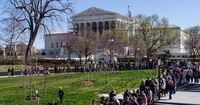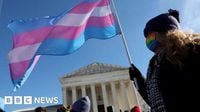On May 6, 2025, the U.S. Supreme Court issued a significant ruling that allows the Trump administration to enforce a ban on transgender individuals serving in the military. This decision comes amidst ongoing legal challenges to the policy, which has been a contentious issue since Trump took office. The court's ruling, delivered via an unsigned order, did not provide any reasoning, a common practice for emergency applications. However, the three liberal justices on the court—Sonia Sotomayor, Elena Kagan, and Ketanji Brown Jackson—publicly dissented, expressing their disagreement with the decision.
The ruling follows a series of executive orders issued by President Trump shortly after he began his second term. On January 20, 2025, he revoked a previous order from President Joe Biden that had allowed transgender service members to serve openly in the military. Just a week later, Trump issued another order stating that "adoption of a gender identity inconsistent with an individual’s sex conflicts with a soldier’s commitment to an honorable, truthful, and disciplined lifestyle." This order set the stage for the enforcement of the ban.
As part of the new policy, the Department of Defense announced in February that it would begin discharging transgender service members. According to officials, approximately 4,200 active-duty members of the military identify as transgender, which represents about 0.2 percent of the total military population. The Trump administration argued that allowing transgender individuals to serve would negatively impact military readiness and cohesion, a claim that has been challenged by numerous studies and expert opinions.
Seven active service members, including Commander Emily Shilling, a naval aviator with nearly two decades of experience, filed a lawsuit to block the ban. Shilling, who has flown over 60 combat missions and whose training has cost the Navy approximately $20 million, argued that the policy violates the Constitution’s guarantee of equal protection. In March, U.S. District Judge Benjamin Settle issued a nationwide injunction that temporarily blocked the enforcement of the ban, stating that the government failed to demonstrate that transgender service members posed a threat to military effectiveness.
Judge Settle's ruling emphasized that there was no evidence to support the administration's claims that transgender individuals harm unit cohesion or military readiness. He noted that transgender service members had served openly for years under previous policies without any discernible negative impact. This injunction was upheld by the Ninth Circuit Court of Appeals, which refused to lift the ban while the case continued through the legal system.
In its emergency application to the Supreme Court, the Trump administration argued for deference to military decision-making and requested that the lower court's ruling be paused. The court's decision to grant this request effectively lifts the injunction, allowing the ban to be enforced while the case continues to be litigated. The administration views this as a significant victory, with White House spokesperson Karoline Leavitt declaring it a "massive victory in the Supreme Court."
However, advocates for transgender rights expressed deep concern over the ruling. Organizations such as Lambda Legal and the Human Rights Campaign Foundation issued statements condemning the decision, calling it a "devastating blow to transgender service members who have demonstrated their capabilities and commitment to our nation’s defense." The ruling has the potential to lead to the immediate discharge of thousands of service members, disrupting military units and careers.
The Supreme Court's decision comes against a backdrop of broader attacks on transgender rights by the Trump administration. Beyond the military ban, the administration has sought to restrict transgender athletes from competing in sports, mandated that individuals use bathrooms corresponding to their sex assigned at birth, and pushed back against the use of preferred pronouns.
As this legal battle unfolds, the Supreme Court is also set to hear challenges to other policies affecting transgender individuals, including a Tennessee law that bans transition care for minors. The outcome of these cases could have far-reaching implications for transgender rights in the United States.
The current landscape of the Supreme Court, with its 6-3 conservative majority, raises concerns for many advocates who fear that the court may continue to uphold policies that discriminate against transgender individuals. The decision to allow the Trump administration's ban to take effect is seen as part of a larger pattern of judicial deference to military policies that may not withstand scrutiny in civilian contexts.
In the wake of the ruling, legal experts and advocates are closely monitoring how this will affect not only the lives of transgender service members but also the overall military readiness and effectiveness of the armed forces. As the legal challenges continue, the implications of this ban will likely resonate far beyond the courtroom, affecting the lives of many individuals who have dedicated their lives to serving their country.






